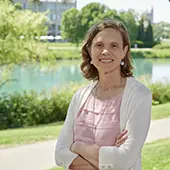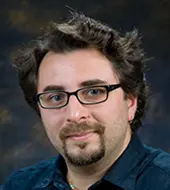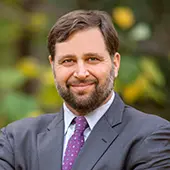Faculty Affiliate Program Connects Researchers and Policymakers Across Disciplines
Emily Ayshford | November 13, 2023
The Paula M. Trienens Institute for Sustainability and Energy Faculty Affiliates program brings together faculty from across the university in a network of interdisciplinary expertise to create sustainable solutions to the world’s greatest energy and environmental challenges.
Through seed funding, research administration, and exposure to the Trienens Institute’s wide network of outside partners, faculty affiliates have access to the resources needed to be on the leading edge of research and policy innovations.
“The Trienens Institute really works to connect faculty with partners across campus and with outside stakeholders,” said Jennifer Dunn, a new faculty affiliate and longtime collaborator of the institute. “They have spent the time and energy to build up a network of researchers and industrial partners in plastics sustainability, which really benefits faculty. It has really informed my thinking on issues of energy and sustainability.”
The institute’s faculty affiliates website allows users to search for affiliates using both school names and research priorities, and applications are open to faculty to join. Membership is open to all Northwestern faculty members whose teaching and/or research activities intersect with its core research priorities. Three faculty affiliates recently discussed their work and how the program benefits them.
Jennifer Dunn
Sustainable solutions to environmental problems cannot just work on their own. They must be viewed through a systems-level lens to ensure they are economically feasible and don’t introduce new, unforeseen problems.
 Jennifer Dunn, professor of chemical and biological engineering, explores the energy and environmental effects of new technologies while also studying how to make current products, like plastics, more sustainable. She uses a variety of tools — including lifecycle assessment and technoeconomic assessments, as well as analyses of materials — to understand the lifecycle and resulting environmental implications of products and processes.
Jennifer Dunn, professor of chemical and biological engineering, explores the energy and environmental effects of new technologies while also studying how to make current products, like plastics, more sustainable. She uses a variety of tools — including lifecycle assessment and technoeconomic assessments, as well as analyses of materials — to understand the lifecycle and resulting environmental implications of products and processes.
She was recently named the chief decarbonization officer for the Department of Energy’s Midwest Hydrogen Hub. The hub, called the Midwest Alliance for Clean Hydrogen (MachH2), will help enable hydrogen use in steel and glass production, transportation, and aviation fuel. Dunn’s role is to study possible solutions and their feasibility.
“We hear a lot about the hydrogen economy,” she said. “But there are a lot of questions and concerns around the overall greenhouse gas benefits from using hydrogen compared to what we’re doing today. We’re going to apply systems-level thinking to understand how this new hydrogen economy will unfold in the Midwest and how we can reduce greenhouse gases.”
Through the Trienens Institute, Dunn has met with several large companies and non-profit organizations throughout the years — meetings that have both informed her thinking and have led to new research collaborations. She also worked with the Trienens Institute on a recent Global Engineering Trek, where she and others traveled with undergraduate students to the Atacama Desert in Chile to study how minerals for lithium-ion batteries are extracted. “Their work has a huge value add for students,” she said.
Being part of the new faculty affiliate program will only further those opportunities, she says. “I look forward to contributing to building initiatives and being involved in cross-stakeholder discussions around sustainability,” she said.
Marco Gallio
Climate change’s growing effects on both humans and animals continues to make headlines, but not as much attention has been paid to how climate change affects insects. Estimates say that 65 percent of insect species could go extinct over the next century.
 Neuroscientist Marco Gallio, who studies temperature responses in fruit flies, wants to change that. “Insects have a huge importance in all ecosystems,” he said. “They are the basis of most of our food chains, and we are facing a dramatic decline of insects all over the world.”
Neuroscientist Marco Gallio, who studies temperature responses in fruit flies, wants to change that. “Insects have a huge importance in all ecosystems,” he said. “They are the basis of most of our food chains, and we are facing a dramatic decline of insects all over the world.”
In his lab with research professor Alessia Para, Gallio studies the neuroscience of thermal preference and temperature responses, trying to understand the neurological basis of how animals evolved to prefer certain temperatures. He recently formed a partnership with Yarrow Axford, professor of Earth and planetary sciences, to study how climate change has affected insects throughout history. Cores of layered mud from Greenland lakes contain specimens of midges (small flies) from different time periods throughout the past 10,000 years. By studying genetic material from these midges, they hope to understand how the insects’ genomes have changed in relation to past climate shifts — which could help better predict what will happen to insects in the future.
Recent advances in DNA extraction technology have made studies like this possible, but the team needed seed funding to show a proof of concept. When Gallio and Axford became affiliates of the Trienens Institute, they applied for and received seed funding from the institute to begin work on the research.
“Seed funding is transformative,” Gallio said. “It allows you to go look at outside-the-box, cutting-edge research that isn’t yet funded by agencies like the National Science Foundation. Once we show this technique could work to study this problem, then we can go get a larger grant. That’s why seed funding is so important for getting research off the ground. It’s fantastic that Trienens Institute has the vision to support new research like this.”
Robert Weinstock
 When Robert Weinstock joined Northwestern’s Pritzker School of Law in 2022, he was excited to use his legal expertise to bring Northwestern’s remarkable science and engineering expertise out into the world to make a real impact on policies.
When Robert Weinstock joined Northwestern’s Pritzker School of Law in 2022, he was excited to use his legal expertise to bring Northwestern’s remarkable science and engineering expertise out into the world to make a real impact on policies.
As director of the law school’s Environmental Advocacy Clinic, he works with law students to do just that. There, students work with law professors on actual litigation or policy projects with outside partners.
The clinic has a longstanding partnership with the Trienens Institute, and last year, students worked with the institute’s partner World Wildlife Fund (WWF) on a project to understand how international agreements can acknowledge and protect Indigenous peoples’ stewardship over freshwater resources. Under the United Nations’ Convention on Biological Diversity — which aims to conserve biological diversity worldwide — creating structures to protect inland waters has not received the same level of priority as land and oceans.
WWF asked the clinic to make sure implementing policies that help protect freshwater do so by empowering Indigenous peoples. Students investigated how to develop and implement Other Effective Area-based Conservation Mechanisms (OECMs) — sites outside of traditionally protected areas — in a way that would strengthen sovereignty and water management practices.
“Environmental law in the United States has been a remarkable success for the specific problems it was designed to solve,” Weinstock said. “We are now facing problems that federal environmental law was not designed to solve. At the EAC, we try to find new ways to approach these problems. Including the EAC allows the Trienens Institute to offer a different type of benefit to its partners rather than just research. It’s about understanding where the rubber hits the road from a policy standpoint.”
In December, Weinstock spoke on a panel on climate pollution and policy at the institute’s Annual Symposium. As a faculty affiliate, Weinstock looks forward to collaborating even more closely with other affiliates and the Trienens Institute’s network of external collaborators.
“Being a faculty affiliate is a great way to bring the law school up to the Evanston campus and collaborate with faculty there. It’s a really nice way to offer a practical perspective and impact to the research community,” he said. “Our clinic is uniquely situated to provide a conduit for all the incredible ideas and research at the university to make an impact in the real world of policy making.”
 Jennifer Dunn
Jennifer Dunn Neuroscientist
Neuroscientist  When
When